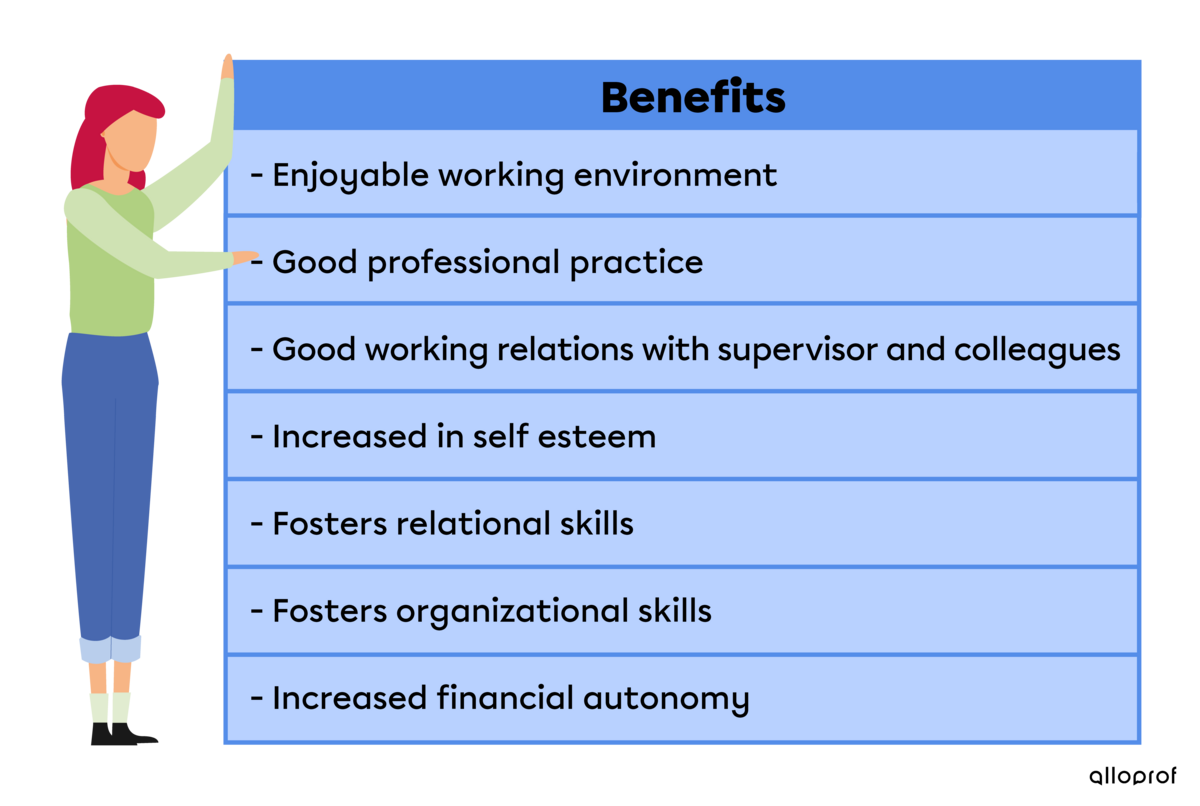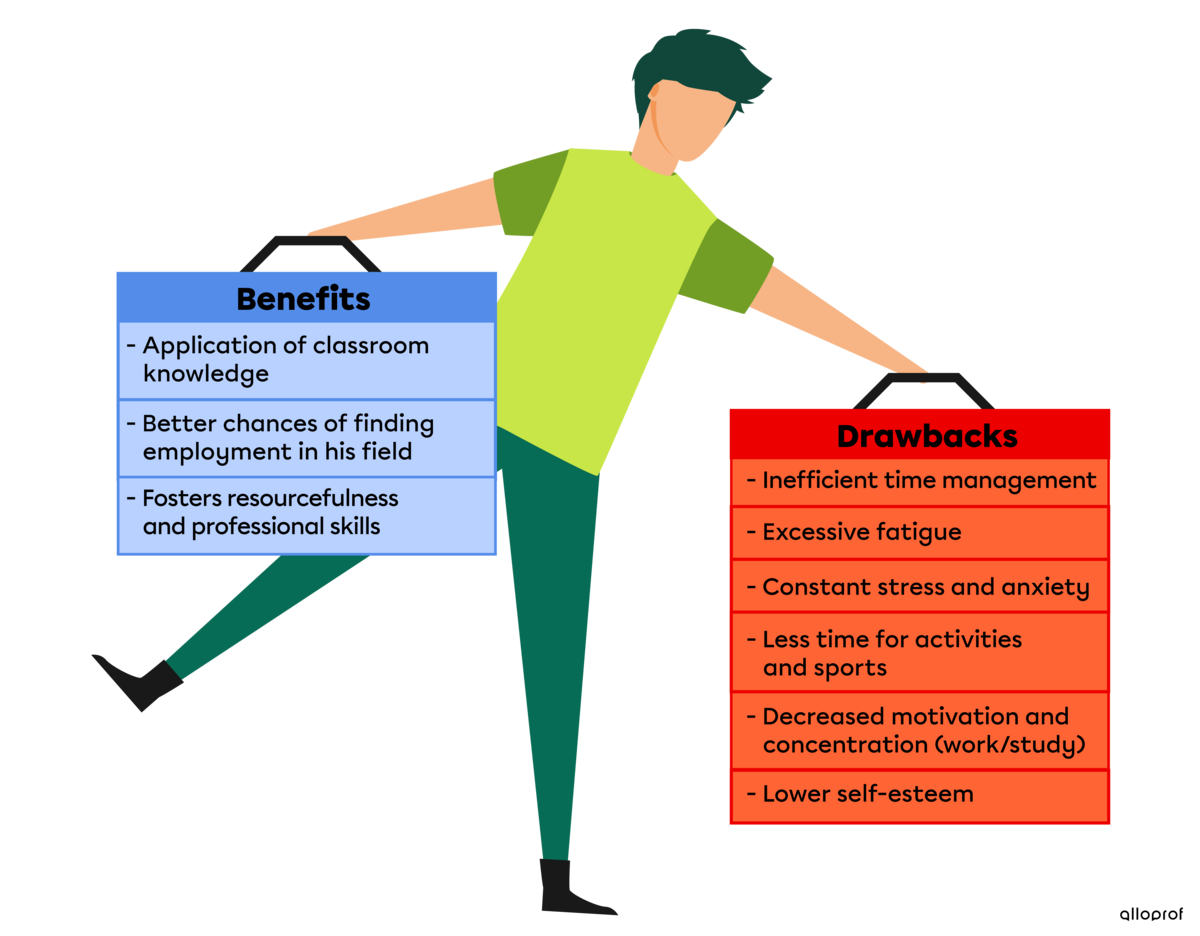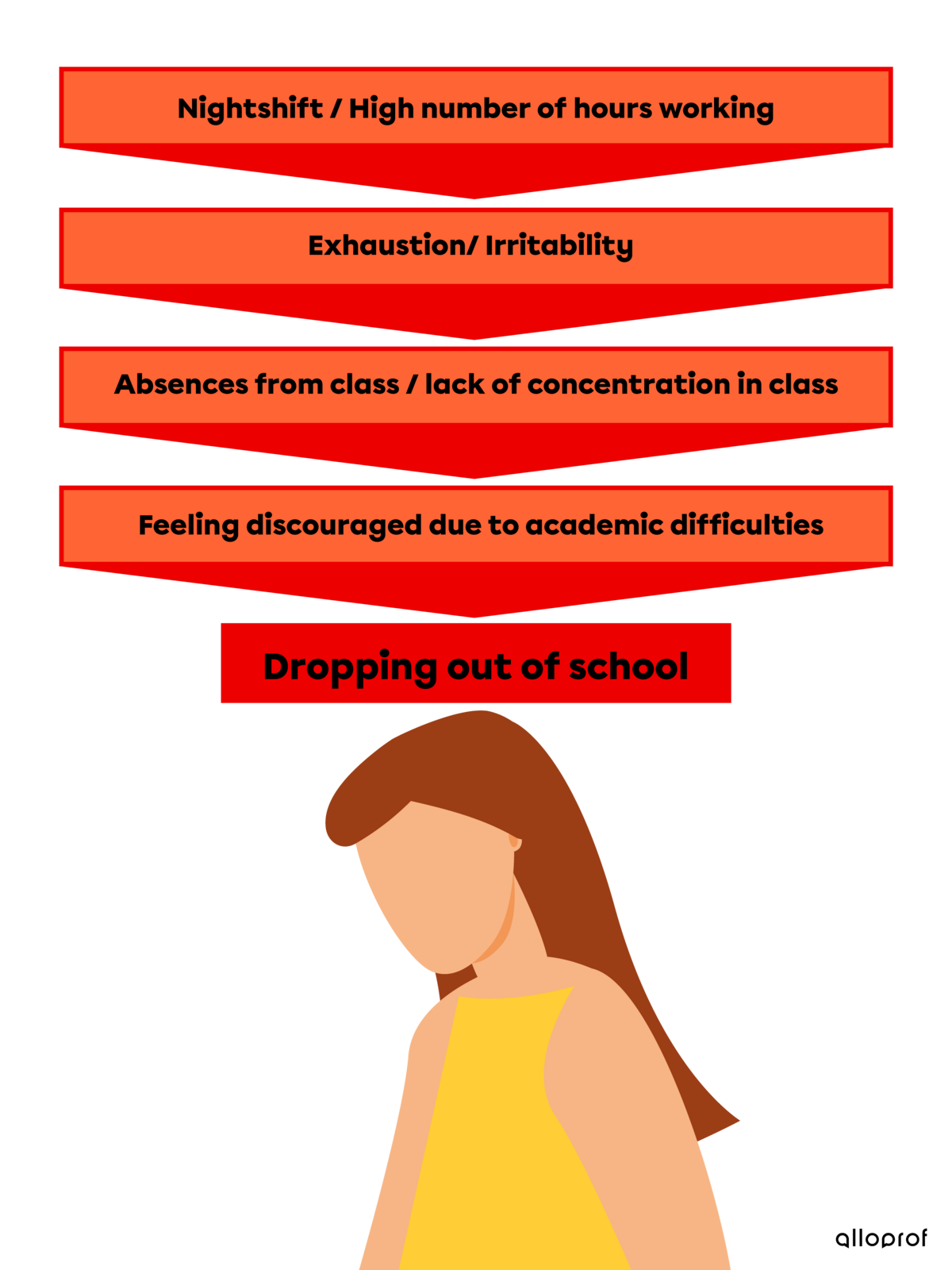You are thinking about getting a part-time job to help pay for your collegial studies in tourism. But before you do, you decide to talk to people around you to get a better idea of the challenges, benefits and drawbacks of balancing school and work.
After talking with friends, you realize that half of them have decided to work during their studies, while the others have chosen to focus on their education. Let’s see what you learned from them.
Lydiane chose to work part-time during her last year of high school and is happy with her decision. After graduating, she plans to train as a computer graphic artist at a vocational school. At the moment, she works in a grocery store on Friday nights and Saturdays. Lydiane likes the atmosphere at work, finds her colleagues very friendly and enjoys talking to the customers. Her boss often tells her how hard she works and notices the enthusiasm she radiates, which improves the overall atmosphere. Lydiane has gained more self-confidence with her employer’s encouragement and her friends have noticed that she is less self-conscious and suggests activities more often.
Lydiane has a regular schedule and never works more than 12 hours a week at the grocery store. During exam periods, Lydiane’s boss agrees to shorten her hours as needed, enabling her to spend more time reviewing her notes for exams. At first, Lydiane struggled to balance her classes with her job, but she developed a few tricks that helped her to be more organized. These include:
-
Writing her study schedule in her agenda, along with her work schedule and free time;
-
Keeping her study space tidy so that she can easily find what she needs;
-
Reducing time spent watching TV and browsing social media and other apps;
-
Making a budget to plan for future expenses, such as car expenses, computer graphics program costs, going out with friends, clothes and her cellphone.
When you think about Lydiane’s situation, you realize that her experience is a fulfilling one. Besides having a pleasant work environment, Lydiane:
-
has learned good workplace behaviour like courtesy, appropriate language and respect for her work schedule;
-
has good relationships with her colleagues and has developed a good rapport with her boss;
-
has better self-esteem thanks to the recognition she receives from her boss;
-
has developed interpersonal skills such as public speaking and encouraging mutual support between colleagues. These skills have enabled her to take more initiative in her life;
-
has developed organizational skills, which is reflected in her education and the planning of her financial needs;
-
has increased her financial autonomy, much to her parents’ delight, and can now pay for her clothes, her outings with friends and her cell phone bill.
Lydiane’s experience shows that working while in school can be a positive thing. In her case, she is enjoying several benefits. Here is a summary of them:

Sébastien’s story is rather different from Lydiane’s. Your friend, who wants to make a difference in the lives of young people, started a three-year early childhood education program. He’s a perfectionist and works hard to pass his classes while completing his third practicum at a childcare centre. When the manager of the centre offered him a job as an educational assistant, Sébastien jumped at the chance. It was clear to him that work experience directly related to his field of education would allow him to put into practice the concepts learned in his courses. He hoped to keep his job after graduating from college or at least use the experience to market himself to future employers. Sébastien did not want to neglect his education and informed his manager that he was available on Tuesdays and Wednesdays, the two days when he did not have classes.
In the beginning, the manager of the centre respected his requests. Sébastien thought he was balancing his time between school and work well. He dealt with many new situations, making him more resourceful and aware of his limits. But as the weeks went by, Sébastien’s manager put more and more pressure on him to work extra hours while many staff members were sick. Not wanting to disappoint the manager and jeopardize his chances of working at the centre after finishing his college program, Sébastien eventually agreed to his boss’s numerous requests.
Over time, Sébastien found it difficult to manage his school schedule. He would review material from class and read his notes late into the night, getting only a few hours of sleep. He became increasingly fatigued and stressed, as well as worried he would fail his classes. He started to skip classes to help out his manager, causing him to spend many hours trying to catch up afterwards. Sebastian no longer had any downtime to take his mind off things. Eventually, he began to question his career choice, because he was less focused both at work and at school and was doubting his abilities.
Here is a table summarizing the benefits and drawbacks of Sébastien’s situation.

In the end, Sebastian decided he needed to rearrange his schedule without having to give up his job or education. He realized that he could either:
-
stop doing dayshifts to work less than 15 hours a week or, if that was not possible, find a childcare job with evening shifts;
- review his weekly schedule to include downtime and sports activities to take his mind off things;
-
make sure to get enough sleep to improve his concentration, energy and academic performance.
By making these changes, Sébastien can continue doing what he loves most: taking care of children while completing his program. This will open other doors for him in the future.
While Lydiane’s school and work experience went well, Rose ended up dropping out of school to focus entirely on her night job as a warehouse clerk for a large retail store. Several things led to this decision, including working the nightshift and performing very physical and repetitive work for more than six consecutive hours. Rose was showing up to her classes exhausted and was not eating healthy because she did not have time to cook well-balanced meals. She found it difficult to get up when her alarm went off at 6 a.m., and sometimes she just stayed in bed instead of going to her classes. At school, she found it difficult to concentrate, fell asleep during her lessons and became very irritable with those around her.
Halfway through the year, Rose got a very disappointing report card: her grades had dropped significantly. She had already saved a lot of money working at the warehouse, which gave her a lot of purchasing power and allowed her not to depend on her parents to buy whatever she wanted. Despite working hard to get better grades, she became discouraged and chose not to finish her school year. She had started to think that she had already found a job that did not require any special qualifications anyway.
-
Purchasing power considers a person’s disposable income to determine the quantity of goods and services they can buy. The lower the price, the greater the purchasing power.
-
The unemployment rate is the percentage of the population that is not working but is actively seeking work.

Here is a summary diagram of the circumstances that eventually resulted in Rose dropping out of school.
Not getting her high school diploma was not a big deal for Rose. She thought she could work as a maid or in a grocery store if the night job no longer suited her. At the time, her decision seemed to make perfect sense. However, Rose should have taken the time to think about the financial implications of her decision. Dropping out of school generally has a negative impact on people’s personal finances, and Rose is no exception. Evidence shows that “a person without a high school diploma earns 15% less and has a 10% lower employment rate than a person with a high school diploma.”
This means that Rose will earn on average almost $7 000 less per year than her friends who graduate. It is also important to note that the average unemployment rate is almost twice as high for people without a diploma as those who finish school. There are fewer jobs available for non-graduates and many employers are reluctant to hire them.
Stephanie is finishing the first year of her college’s office automation program and is not working right now. To help pay for her education and cut down on all the expenses related to her studies, she took a summer job as a dishwasher in a restaurant near her home. Satisfied with her services, her boss promised her a job next summer so she will not have to look for a job at the end of the school year.
Although Stephanie prefers not to work during the school year, she is very involved in her community and in various school committees. Like Lydiane, Stephanie volunteers two nights a week at a seniors’ home, which gives her a strong sense of accomplishment because she feels she is making a difference. The residents are grateful for the time she spends caring for them.
Cedric plans to take a technical course in hotel management but is still undecided about working during the school year. While his parents pay for his basic needs, such as food and housing, Cedric still needs extra money to pay for his cell phone expenses and a trip he is planning. Like Cedric, you think working while studying might give you more financial independence.
You check with your college and find out that a paid internship program exists that would allow you to work in your field of education and help pay for a lot of your expenses. You would be crazy to turn down this opportunity!
The government has set up the Work-Study Program to help students who are facing financial difficulties to work part-time at their educational institution. Find out more about the eligibility requirements for this program and the participating schools on the Student Financial Assistance website.